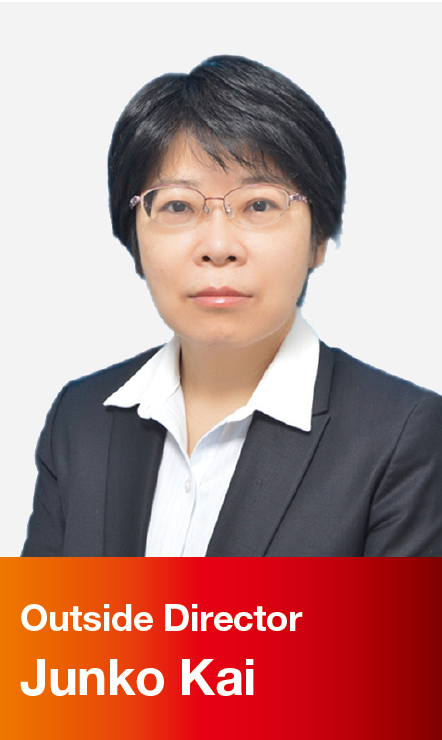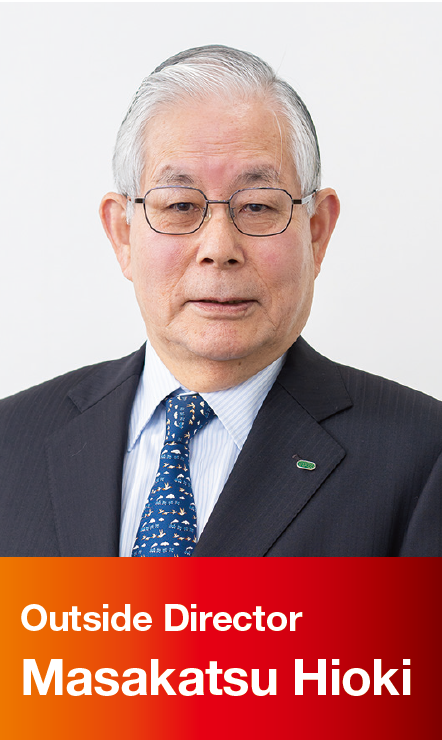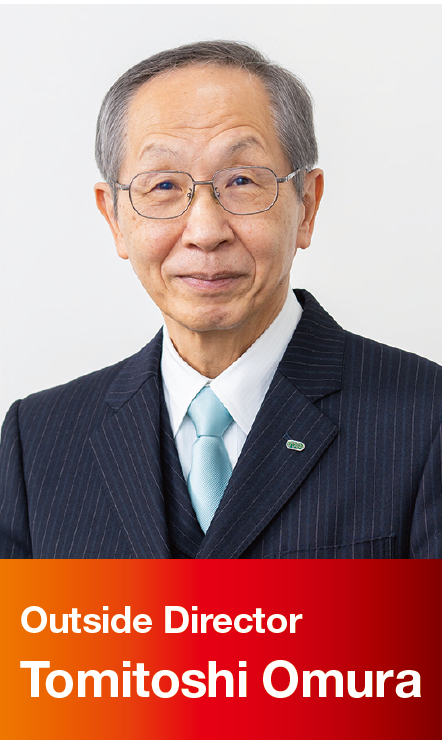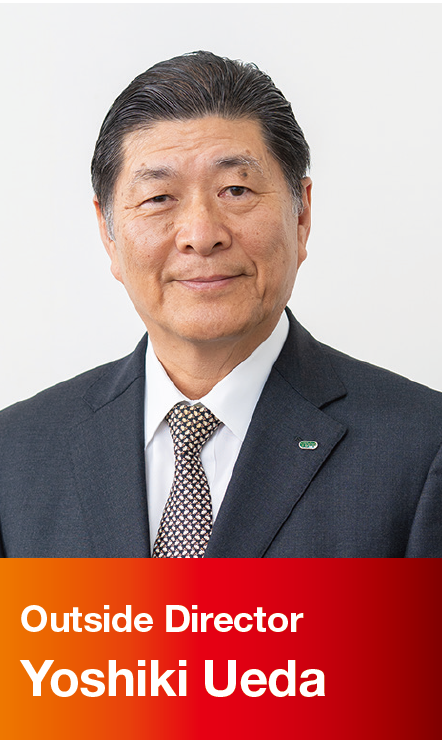Messages from Outside Directors
Continue to be the market’s favorite, THK.

Creating products that become market favorites is essential to executing and achieving THK’s new management policy. This requires dedicating resources to the development, production, and sale of competitive products with high added value. Improvements that increase profit and profit margin as well as sales are also important.
So that all employees share a sense of urgency and come up with creative solutions together, it is crucial that THK foster a company culture where all can share their thoughts freely and have their opinions respected.
I want THK to develop all aspects of its business by constantly re-evaluating set practices and unflinchingly pivoting away from those that do not adequately serve their purpose. Share information about growing markets, face barriers to entry together, strengthen Group-wide collaboration, and seize opportunities in various fields beyond traditional customers and markets. A company-wide infrastructure for accessing important data and information will likely be necessary for this.
As a legal expert and a voice from outside the company on the Board of Directors, I promote comprehensive discussion of critical decisions. I listen attentively to the candid perspectives that arise in other forums to gain a broader view of THK’s challenges and risks.
The Board of Directors will need to make increasingly crucial decisions to achieve the goals of the new business policy. While evaluations of the Board’s effectiveness have laid the foundation for discussions that take risk into account, closing the information gap between internal and outside directors is essential to increasing its effectiveness further.
Information has increasingly been shared promptly with outside directors, so I anticipate that the Board of Directors will continue to evolve as a forum for deeper deliberations, questions, and answers arising from a broader shared awareness of THK’s options and their pros and cons, and I myself would also like to contribute to that evolution.
Parties within and outside of THK will expect the company to flexibly navigate this period of drastic change with a steady gaze on the challenges it will engage with over the next 10 years and the 10 after that. I personally find the current management both extremely reliable and deeply passionate about cultivating sustainable growth.
Finally, my hope is that THK will remain the market favorite by reevaluating longheld norms; repeatedly choosing which to keep and which to discard; pursuing more efficient, dynamic activities; and growing into a company where employees Group-wide can work with passion toward their hopes for the future.
Make THK an even more satisfying place to be.

Until now, THK has worked toward its new management policy of achieving an ROE greater than 10% as quickly as possible by focusing on fiscal activities that shrink the denominator of the ROE equation. In addition to this, the goals outlined in this year’s management plan and in the path to an ROE greater than 10% call for pursuing increased profitability to grow the numerator of that equation. Achieving this will require the proactive efforts of each employee. When THK decides on a goal, it takes action quickly, so it is important that upper management explain things concretely in a way that all employees can understand and that they follow through with their stated intentions. Of course, not all employees have the same role. Specifically, I think spurring more lively middle-up and middle-down management by getting middle management’s buy-in is key.
Directors have a duty to share their thoughts and opinions. These must reflect the realities of the company seen not from outside or above, but from within, from the perspective of employees.
With a Chairman who previously served many years as President, THK as a whole seems to think that, as long as the President’s orders are followed, everything will be fine. The leaders on site at each location, however, are the ones who are most aware of and best able to respond to the realities their departments face. Just as there are things only the President can do, there are things only those on site can do. My fervent hope is for these individuals to act with a sense of pride in their unique position.
I believe the most valuable corporate resources are employees who work enthusiastically in lively workplaces. While upper management is clearly moving toward this vision, bringing out the best in employees requires an approach to human resources that incorporates their perspectives as well as the administrative one. As the role of President changes hands, there is a chance for great strides to be made toward this employee-centered approach. Ultimately, I want to see approaches to HR that center less on human capital and more on employee engagement and making THK a company that offers even greater satisfaction from being part of the organization.
As Chair of the Nomination Advisory Committee, I’m involved in reviewing the executive compensation system and the makeup of the Board of Directors. I think involving outside directors in selecting upper management and determining their compensation is necessary to ensure fairness and objectivity. However, having outside parties involved in personnel and performance evaluations is a difficult proposition, and may actually prove unfair in certain ways. Executive bodies should discuss their own staffing needs, performance evaluations, and compensation and be able to explain their decisions to external stakeholders. This is where outside perspectives are needed. It is difficult for outside directors to truly see things from inside a company, but we bring information from outside it along with years of experience. Use us as a resource, fully and without hesitation.May the new management policy be a turning point for THK.

For THK to grow as a business, it must use its machine components as a foundation to expand its mechatronic module offerings while rapidly creating a maintenance service
structure that utilizes
 and other tools. It should combine generative AI with the wealth of knowledge it has amassed by problem solving across many industries to provide more optimal, high-level solutions and drive customer satisfaction ever higher.
and other tools. It should combine generative AI with the wealth of knowledge it has amassed by problem solving across many industries to provide more optimal, high-level solutions and drive customer satisfaction ever higher.
THK will need to build a diverse customer portfolio and a stable profit base by looking beyond its traditional, less-predictable machine tool, semiconductor, and robot markets so that it can also concentrate resources in emerging fields like medicine, railways, aircraft, EVs, renewable energy, and logistics. It must also shore up production facilities outside of Japan in areas of low geopolitical risk, localize more of its material procurement, and reduce production costs to increase cost competitiveness.
Achieving sustainable growth requires a reevaluation of THK’s business portfolio through the lenses of profitability and capital efficiency as well as a strategy of selection and concentration for effective allocation of resources to critical products and technological development. To bolster sales and reduce production costs, THK must also consider proactive use of M&A, expand its approach to managerial accounting, and establish a structure for making business decisions based on an accurate understanding of each venture’s profitability. Increasing productivity per person by implementing generative AI, automating production, optimizing internal and external production structures, reducing material cost ratio, and reskilling excess support and management staff will also be crucial.
As an outside director with years of experience and specialist knowledge in the field of accounting, I am responsible for reviewing THK’s profitability and capital efficiency and monitoring how it promotes the strategy of selection and concentration. With this in mind, I do my utmost to assure fiscal due diligence in corporate acquisitions while also overseeing the managerial accounting and controls of THK and its subsidiaries.
Shareholders and investors have praised THK’s fiscal strategy to this point, from forward-thinking investments for future demand on the industrial machinery business side and profitability improvement initiatives on the automotive and transportation business side to the adoption of IFRS and a unified fiscal year and the transition to a consolidated capital management structure. I believe the new management policy of achieving an ROE greater than 10% and an operating income greater than ¥40 billion, which arose from the deliberations of the Board of Directors, has the potential to be a major turning point in THK’s history in its own right. As a director, I look forward to seeing THK turn this new policy into a reality.
Hasten change today to shape the THK of tomorrow.

As part of achieving the new management policy goal of an ROE greater than 10%, I want to see THK’s core industrial machinery business engage in sweeping discussions of revising its product offerings and optimizing its production processes from a profitability perspective, evolving its business model while carving out a dominant position in its field. On the other hand, the automotive and transportation business, which is facing market changes and challenges to securing profit consummate with its large investments of capital, has entered a period in which it must carry out a strategy of selection and concentration on a level not seen before and set a timeline for the execution of that strategy, even as it keeps its options open. Resources should be focused to favor growing fields and high-profit business by establishing shared quantitative standards that answer questions like: “Can we use our limited corporate resources here to increase profit enough to offset capital expenditures?” or “Do we see potential for growth here?” THK should forget its past successes for the time being and focus on envisioning what it needs to look like 10 and 20 years from now, charting a course in that direction, boldly executing selection and concentration, and moving toward its vision faster.
We outside directors are expected to help THK become a better, stronger company in the eyes of its stakeholders. To this end, we use meetings of the Board of Directors to prompt discussions for creating sustainable growth and increasing long-term corporate value, to offer our perspectives, and to help align management priorities as well as for regular resolutions and reports. THK’s outside directors together bring a breadth and depth of specialist knowledge and extensive experience in their respective fields. We will continue to exercise sound governance to support THK’s further development.
In my previous work at a trading company, we dealt with so many different business areas that it was a struggle to optimize how we allocated corporate resources. But we broke out of this model, setting company-wide quantitative standards, clarifying our stance with each type of business, and embracing a strategy of selection and concentration according to set rules. As a result, our profits soared. While trading and manufacturing approach some things differently, I will use that experience to support change at THK as much as I can. From that vantage, I see THK’s management of business risk to be a bit wanting still. With geopolitical risks escalating everywhere in today’s world, plans and preparations for business risk scenarios are needed in addition to a BCP. A fiscal strategy to deal with maximum foreseeable loss is also essential. The Board of Directors should take these up as critical management issues going forward.
I also serve as chair of the Remuneration Advisory Committee. The performancebased compensation rate for executive compensation was increased a while back, but achieving an ROE greater than 10% as quickly as possible will require aligning employee goals and sense of purpose. This is why I want to propose a scheme that awards performance-based bonuses to all employees when the company achieves its goals. THK has the excellent business philosophy of being a company focused on creation and development as well as a capacity for rapid action. I want it to see change as an opportunity, accelerate the work to bring it about, and launch itself to the next level.